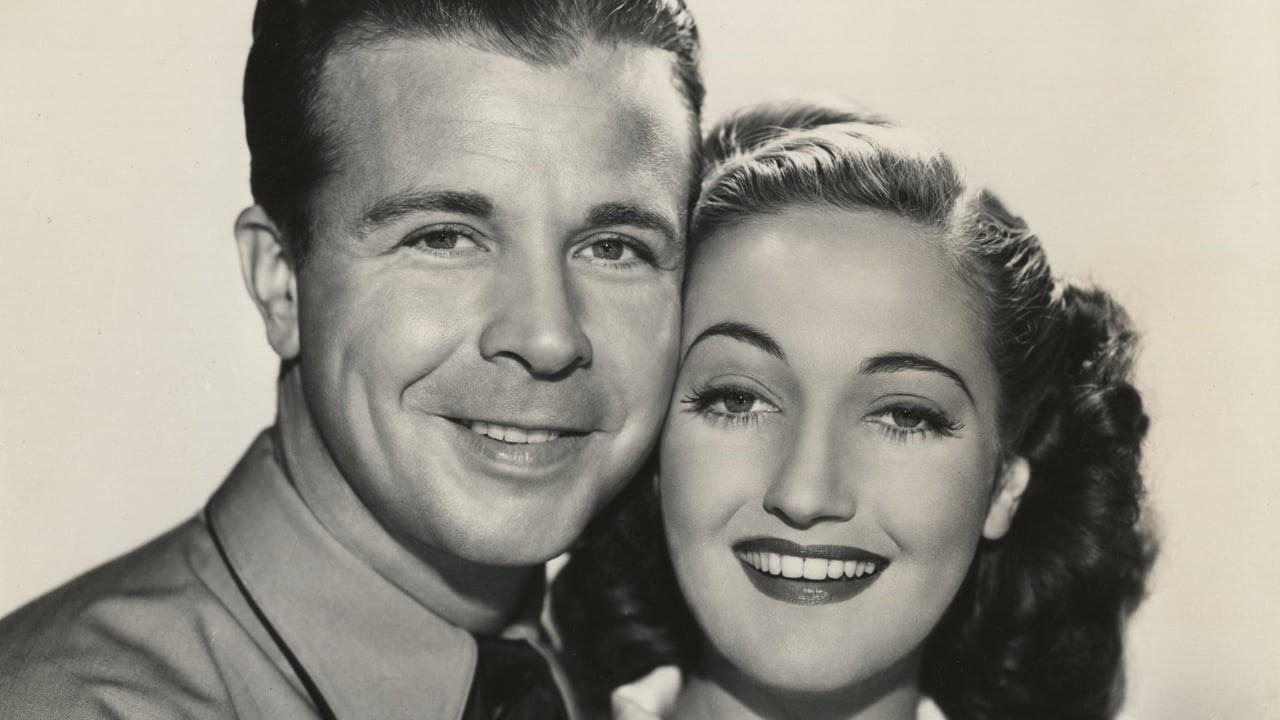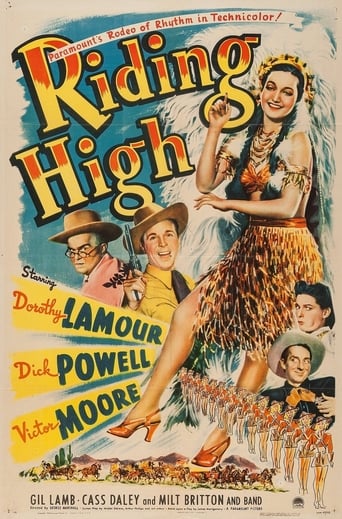Interesteg
What makes it different from others?
Tockinit
not horrible nor great
CommentsXp
Best movie ever!
Bessie Smyth
Great story, amazing characters, superb action, enthralling cinematography. Yes, this is something I am glad I spent money on.
rik1944-168-418265
George Marshall made many fine comedies during his long career, but this is not one of them. I have seen over 15,000 films and this is one of the worst major studio US films I have ever seen. The music and "comedy" is unendurable and nothing works - truly a disaster on every level (OK, the technicolor is adequate). Dick Powell and Victor Moore seem to be doing it for the paycheck, and Dorothy Lamour seems to be waiting for Hope or Crosby to show up. Cass Dailey is screechingly bad. I got this rare title from UK TV (Channel 5), and it makes bad UK comedies like the Old Mother Riley series seem like Lubitsch comedies. Truly, this is only for masochists.
mark.waltz
This western musical about a burlesque queen (Dorothy Lamour) coming back home to help out on her family ranch is overloaded with dated comedy and unremarkable songs. The silly plot concerns a seemingly milquetoast forger (the adorable Victor Moore) passing out fake thousand dollar bills (and getting real money as change back) while Dick Powell, as the gold prospector, falls in love with Lamour. The film really seems like a "Road" movie tat didn't sell. Big-toothed Cass Daley is equally big voiced, but her material defeats her. A second rate Martha Raye, she was about to be replaced in these type of roles by Betty Hutton. Moore is lovable as always, getting the best material, especially when he fleeces a bunch of card-sharks with one of his counterfeit K-notes. Lamour manages to survive some mediocre production numbers and her burlesque outfits resemble sarongs in some of them. The film also lacks a cast of familiar character performers which takes away much of the amusement found in other 1940's musicals.
bkoganbing
Riding High marked the end Dick Powell's association with Paramount Pictures. He never went back on the Paramount lot after finishing Riding High.Seeing it now, Riding High has the look of a Bob Hope film and I have a feeling that's who the original male lead was supposed to be. My guess is that Rapid Robert was entertaining the troops on some far distant shore and Powell was shoved into this film to appear opposite Dorothy Lamour. Harold Arlen and Johnny Mercer wrote some forgettable songs for this film.Funny thing is that Paramount seemed to spend a pretty penny on Riding High. It was shot on location in Arizona, not on the studio back lot and it did actually get an Academy Award nomination for sound.Poor Dick Powell just walked through this film and supporting players like Cass Daley and Victor Moore and Gil Lamb stole the film right out from under him. Powell plays a salesman who has sold mining stock to Dorothy Lamour's father George Carleton who has no operating capital though and relies on Powell to get some. In trying to raise the capital Powell gets himself involved with Victor Moore, a mild mannered counterfeiter who's carrying a nice wad of the bogus cabbage. Moore passes it when he has to, but he's evolved his own system based on the old Mark Twain story that was later made into a Gregory Peck film, Man With A Million. The premise is that if people know you are well heeled, doors of credit automatically open for you and you need not necessarily pass the stuff and thereby endanger your freedom. A lot of the comedy here is based on Victor Moore constantly trying to fend off one lug-nut of a sheriff in Gil Lamb who is trying to catch him with the goods. Moore also is at the same time fending off the amorous intentions of amazon Cass Daley. These three totally steal the film from Powell and Lamour. There's a chuck wagon race at the end where rich rancher Russell Simpson bets against Cass Daley's rig with Moore and that gets pretty wild. It's Powell and what he does in that race that makes me think this was intended for Bob Hope.While shooting this film, Powell who had been promised by Paramount executives that he would be getting some serious dramatic roles, learned that a part he wanted very badly in Double Indemnity was given to Fred MacMurray. According to the films of Dick Powell, he got a release from his contract and refused to ever work there again in the same way he never worked for Warner Brothers again either after leaving them in the Thirties for the same reason.Riding High is a mildly amusing film today with the supporting cast just taking over from the uninterested leads. Not a film Dick Powell had pleasant memories of.
zingbing
Attention Spike Jones fans: this film is essential viewing if you are fortunate enough to have the opportunity! Quite unlike the previous reviewer, I was nearly giddy upon seeing the lowbrow slapstick sequence of Gil Lamb playing clarinet in Milt Britton's band. Milt and Frank Britton, along with other comedy/novelty/"corn" outfits (The Kidoodlers; Freddie Fisher and his Schnickelfritz Band), have been cited as major "musical" influences on the young maestro Jones. According to Spike Jones biographer Jordan R. Young, "By all accounts the Brittons had far and away the zaniest act of its day - they were the only "jazz band" whose members routinely fell into the orchestra pit, squirted water at one another, fired pistols in the air or broke violins over each other's heads." Unfortunately, apart from a Soundie musical short of "The Poet and Peasant Overture" not much Milt Britton footage is readily available. So when I came across a black and white print of this Technicolor flick on eBay, well, I had to have it. I was not disappointed: here we are able to see what helped inspire Jones's "Musical Depreciation Revue". Any Three Stooges fan will love this completely over-the-top, violent routine that climaxes with the entire orchestra reducing the stage, along with a breakaway grand piano, to smithereens. (Remember the protracted destruction of Jonathan Winters leveling a gas station in Stanley Kramer's "It's a Mad Mad Mad Mad World"?) Sure, most moviegoers will find this film's plot threadbare, but what do you expect from a low budget musical? In fact, fans of "B" movies and "turkeys" shouldn't miss a couple of its outlandish "production" numbers, including one with a painfully politically incorrect American Indian theme. Now if only I can find a Technicolor print!

